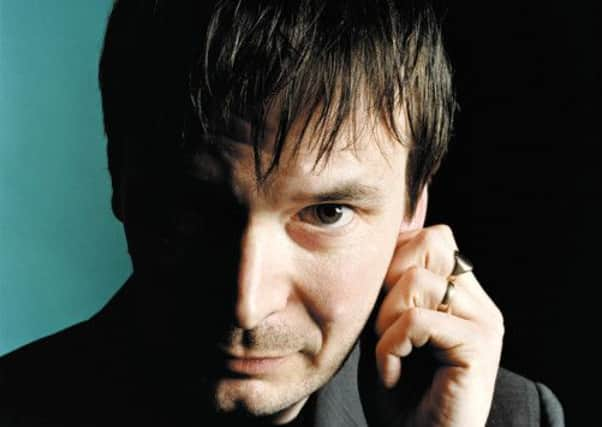The Big Interview: Ian Rankin


Soap writers pen climatic exits for leading characters confident that if ratings dip they can be return in similarly dramatic fashion. Even death needn’t be the final curtain.
When Ian Rankin bade farewell to the dour Scottish detective who had made his name and paid the bills for the best part of three decades, he honestly believed there would be no last minute revival, no u-turn. It just wasn’t part of the plot.
Advertisement
Hide AdAdvertisement
Hide AdThe often curmudgeonly, always doggedly determined Detective Inspector John Rebus had raised his first pint in Edinburgh’s Oxford Bar back in 1987 and from the very first chapter of Knots and Crosses, Rankin had faithfully written in real time. By 2007, Rebus had been embroiled in 17 different cases, had regularly sought solace in the bottle and seen his personal life unravel. While Rankin had never blessed him with youthful optimism, 30 years on, Rebus had come to the end of the road. He was 60 and it was time to allow him to retire gracefully.


Rankin was true to his word and in Exit Music, Rebus made his excuses and left St Leonard’s police station. And that would have been that, had a friend not mentioned changes to the retirement age. It was the excuse fans of the series had been waiting for, but Rankin has always insisted that he hadn’t given much, if any time, to planning a possible reincarnation.
“I didn’t miss him at all, he was gone from my head for quite a while, and yet when I sat down [to write a new novel] he was just there – the voice, the cynicism, the looking at the world through weary eyes, the predilection for trouble,” says the author.
When it was published back in November, Standing in Another Man’s Grave was variously described as “impeccably crafted”, “irresistibly morose” and quite simply “genius”. It was also classic Rebus, as the retired detective returned to the cold case unit as a civilian.
Advertisement
Hide AdAdvertisement
Hide AdWhile he might no longer have had the official title, in character he was much the same, effortlessly putting colleagues’ backs up while helping to solve the case of several missing girls.
Rankin, whose thrillers account for 10 per cent of crime fiction sales in the UK, had pulled off the comeback in some style.
Standing in Another Man’s Grave replicated the success of previous Rebus novels, was number one in the book charts and added to its author’s already tidy nest egg. However, despite his enormous success – Rankin has made a reported £25m from his books, a figure to make most authors weep – he also appears little changed from the man who in a previous life worked as a grape picker, music journalist and occasional punk band member. He also still worries that his next book might not be as good as the last.
“There have been many points in my life when I’ve thought, ‘This ain’t going to work’, it started when I was five or six-years-old writing little stories and I’ve never lost that feeling. People don’t realise, they think you’ve been popular for ever, but I was only paid £200 for my first novel back in 1986. What’s funny is that now copies of it fetch more than that each because it was a limited print run.
Advertisement
Hide AdAdvertisement
Hide Ad“I don’t know what story’s going to pop into my head. It doesn’t get any easier. You’re always up against yourself. You have to work that little bit harder all the time.’’
While Rankin’s books would no doubt continue to sell in their millions even if he never did another round of publicity, the writer has always been keen to meet his readers. He tours extensively, appears regularly on TV, notably as a reviewer on BBC2’s Newsnight Review and this summer Yorkshire audiences will have the chance to catch him at least twice – once at the Beverley Folk Festival in June and again the following month at Theakstons Old Peculier Crime Writing Festival in Harrogate.
Rankin knows he has found himself in a fortunate position. Yet he can’t help feeling that our apparently insatiable appetite for Scandinavian crime writers has left equally talented authors in the shade.
While a number of his books have been adapted for television, with both John Hannah and Ken Stott playing Rebus, they were made to a familiar and peculiarly British format.
Advertisement
Hide AdAdvertisement
Hide Ad“I’m very jealous that when something Scandinavian comes on TV, it gets given 10 or 20 hours,” he says. “The Rebus novels got 45 minutes per book, which was frustrating for me. There was very little space for character development.
“I’ve never watched Rebus because I don’t want actors’ voices and faces to start interfering with the voices that are already in my head.”
Rankin lives in Edinburgh, two doors away from fellow author Alexander McCall Smith and across town from his pal and former neighbour JK Rowling. He likes to remain pretty anonymous about town and cuts a fairly low-profile figure when contemplating his latest book in the pubs frequented by his fictional detective.
Keeping a routine has always been important and he writes one book a year, working in the study of his substantial house in Edinburgh, where he lives with his wife, Miranda Harvey. And for all the money he has made, Rankin’s needs are pretty ordinary. He drives a Volvo, an buys a lot of records, books and beer – all things he spent money on as a student.
Advertisement
Hide AdAdvertisement
Hide Ad“The great thing about being an author is being your own boss,” he says. “I tend to start around 11am and finish about 3pm. I might work at night if it’s going well, but I don’t stick to any hard and fast rules. When people are asking you to do all sorts of other things, I have to remind myself that writing is what I do for a living.
“No one becomes a writer because they enjoy being in the public eye, you become a writer because you enjoy being alone in a room.”
Balancing family life with his career is tough, he admits. His oldest son, Jack, is studying classics at Newcastle, while his 18-year-old son Kit suffers from Angelman syndrome, a rare genetic disorder that has left him blind and unable to walk or talk. He attends a special school and also has a carer who lives at the family home.
Rankin reflects that Kit helped make his writing stronger, as he poured all his distress and anger about his son’s condition into his novels.
Advertisement
Hide AdAdvertisement
Hide Ad“While he was being diagnosed I was writing a book called Black And Blue, which was a much bigger, angrier book than previously. We were going to the hospital and having meetings with specialists, then I would go home and I’d go to my study and I would suddenly get to play God. I could create this alternate universe that would be exactly the way I wanted it to be.
“It was quite therapeutic at a time when in our real lives we didn’t have much control over what was going on. I channelled a lot of the questions that I had about the world, and the anger and frustration about Kit’s condition, into that book. It ended up winning the Crime Writers Association Gold Dagger for the best crime novel of the year, and it sold four times as many copies as my previous books.’’
Before Kit was born, Rankin had had limited success and wasn’t making much money. His publishers were worried he would never make the bestseller list.
“I was having panic attacks. I would jump into the car in the middle of the night and go for a drive, yell and scream, and that got worse when Kit came along.’’
Advertisement
Hide AdAdvertisement
Hide AdDespite being severely disabled, Kit is very happy, says Rankin. Angelman syndrome used to be called “Happy Puppet” syndrome because those with it are happy for a lot of the time.
“He’s not autistic or withdrawn,” says Rankin. “He’s 18 but his level of perception is that of an infant. He can’t walk or talk and he can’t do sign language, but we take him horse riding and even skiing with various charities and he loves it. He’s almost better known in Edinburgh than I am.”
Ian Rankin will be appearing at Beverley Festival in an event which will combine his two loves – words and music. On June 23 he will be celebrating the talent of Scottish songwriter Jackie Leven who died two years ago in an event featuring song, anecdotes and prose. www.beverleyfestival.com. For more details of his appearance at Theakstons Old Peculier Crime Writing Festival go to www.harrogate internationalfestivals.com.